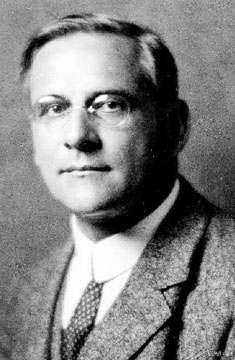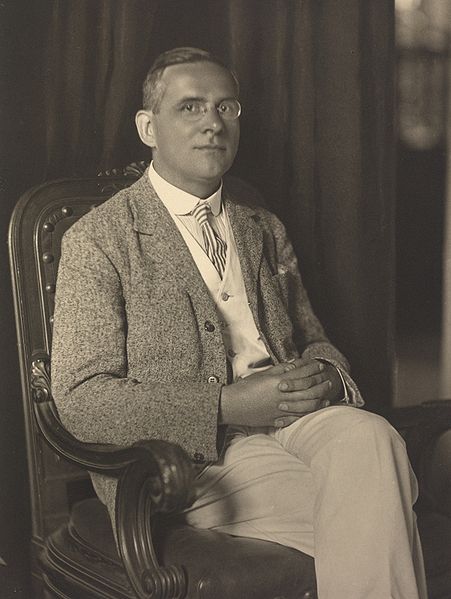<Back to Index>
- Philosopher Moritz Schlick, 1882
- Painter Victor Elpidiforovich Borisov-Musatov, 1870
- President of the Continental Congress John Hanson, 1721
PAGE SPONSOR


Moritz Schlick (April 14, 1882 – June 22, 1936) was a German philosopher and the founding father of logical positivism and the Vienna Circle.
Schlick was born in Berlin to a wealthy family. He studied physics at Heidelberg, Lausanne, and, ultimately, the University of Berlin under Max Planck. In 1904, he completed his dissertation essay, "Über die Reflexion des Lichts in einer inhomogenen Schicht" ("On the Reflection of Light in a Non-Homogeneous Medium"). In 1908, he published Lebensweisheit ("The Wisdom of Life"), a slim volume about eudaemonism, the theory that happiness is the highest ethical pursuit. His habilitation essay, "Das Wesen der Wahrheit nach der modernen Logik" ("The Nature of Truth According to Modern Logic"), was published in 1910. Several essays about aesthetics followed, whereupon Schlick turned his attention to problems of epistemology, the philosophy of science, and more general questions about science. In this last category, Schlick distinguished himself by publishing a paper in 1915 about Einstein's special theory of relativity, a topic only ten years old. He also published Raum und Zeit in der gegenwärtigen Physik ("Space and Time in Modern Physics"), a more systematic treatment of post-Newtonian physics.
In 1922, Schlick became a professor in the philosophy of inductive sciences at the University of Vienna after two unsatisfying appointments in Rostock and Kiel. In the same year occurred two events that shaped the remainder of Schlick's life. First, a group of philosophers and scientists (including but not limited to Rudolf Carnap, Herbert Feigl, Kurt Gödel, Hans Hahn, Otto Neurath, and Friedrich Waismann) suggested to Schlick that they conduct regular meetings to discuss science and philosophy. They initially called themselves the Ernst Mach Association, but forever after they have been known as the Vienna Circle. The second great event of 1922 was the publication of Ludwig Wittgenstein's Tractatus Logico-Philosophicus, a work of terse, lapidary brilliance that advanced, among other things, a logical theory of symbolism and a "picture theory" of language. Schlick and his group were overwhelmed by the work: they made it a topic for discussion at nearly every meeting. Schlick himself contacted Wittgenstein in 1924 and extolled the virtues of Wittgenstein's book vis-a-vis his immediate circle. Eventually Wittgenstein agreed to meet with Schlick and Waismann to discuss the Tractatus and other ideas. Through Schlick's influence, Wittgenstein was encouraged to consider a return to philosophy after some ten years of idleness. It is partly to Schlick's credit that Wittgenstein began to pen the reflections that make up large parts of Philosophical Investigations. However, Wittgenstein came to feel that the circle chose to ignore certain metaphysical assertions on his part, which he believed were essential to acknowledge, and that they would only consider that which confirmed their logical positivist agenda. This eventually became the prime reason that he refused to attend further meetings. Despite this, Schlick and Waismann's discussions with Wittgenstein continued until the latter felt that germinal ideas had been used without permission in an essay by Carnap. Wittgenstein continued discussions in letters to Schlick, but his formal association with the Vienna Circle ended in 1932.
Schlick had worked on his Allgemeine Erkenntnislehre (General Theory of Knowledge) between 1918 and 1925, and, though later developments in his philosophy were to make various contentions of his epistemology untenable, the General Theory is perhaps his greatest work in its acute reasoning against synthetic a priori knowledge. This critique of synthetic a priori knowledge argues that the only truths which are self-evident to reason are statements which are true as a matter of definition, such as the statements of formal logic and mathematics. The truth of all other statements must be evaluated with reference to empirical evidence. If a statement is proposed which is not a matter of definition, and not capable of being confirmed or falsified by evidence, that statement is "metaphysical", which is synonymous with "meaningless", or "nonsense". This is the principle upon which members of the Vienna Circle were most clearly in agreement. Between 1926 and 1930, Schlick labored to finish Fragen der Ethik (Problems of Ethics), in which he surprised some of his fellow Circlists by including ethics as a viable branch of philosophy. In his 1932 - 1933 contribution to Erkenntnis III, "Positivism and Realism", Schlick offered one of the most illuminating definitions of positivism as every view "which denies the possibility of metaphysics". Accordingly he defined metaphysics as the doctrine of “true being”, “thing in itself” or “transcendental being”, a doctrine which obviously "presupposes that a non-true, lesser or apparent being stands opposed to it". Therefore in this work he bases the positivism on a kind of epistemology which holds that the only true beings are givens or constituents of experience. Also during this time, the Vienna Circle published The Scientific View of the World: The Vienna Circle as a homage to Schlick. Its strong anti-metaphysical stance crystallized the viewpoint of the group.
With
the
rise
of the Nazis in Germany and Austria,
many of the Vienna Circle's members left for America and the United
Kingdom. Schlick, however, stayed on at the University of Vienna. When
visited by Herbert Feigl in 1935, he expressed dismay at events in
Germany. On June 22, 1936, Schlick was ascending the steps of the
University for a class when he was confronted by a former student, Johann
Nelböck, who drew a pistol and shot him in the chest.
Schlick
died very soon afterward. The student was tried and sentenced, but he
became a cause
célèbre for
the
growing
anti-Jewish sentiments in the city. (That Schlick was not Jewish tended
to be overlooked.) Nelböck was paroled shortly
afterward and became a member of the Austrian Nazi Party after the Anschluss. Schlick's
enduring contribution to the world of philosophy is as the fount of
logical positivism. His humanity, good will, gentleness, and especially
his encouragement have been documented by many of his peers. Herbert
Feigl and Albert
Blumberg, in their excellent introduction to "General Theory of
Knowledge," have written, No
other thinker was so well prepared to give new impetus to the
philosophical questings of the younger generation. Though many of his
students and successors have attained a higher degree of exactitude and
adequacy in their logical analyses of problems in the theory of
knowledge, Schlick had an unsurpassed sense for what is essential in
philosophical issues. – Feigl and Blumberg, Introduction, General
Theory
of Knowledge, p. xxi